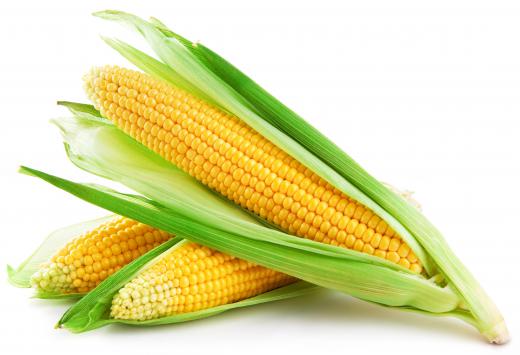What is Agriculture and Food Science?
 Mary McMahon
Mary McMahon
Agriculture and food science is a field of study which focuses on improving the productivity, quality, and safety of agricultural practices and practices related to bringing food from farm to table. Many colleges and universities offer training in this field, as do some technical schools and specialty high schools. Many people working in this field have a bachelor of science degree in agriculture and food science, although some of the leading individuals in the field have graduate level degrees.
This field of study is quite large. Agriculture and food science covers topics such as: farming practices; crop yields; crop harvesting; transport of harvested crops; food safety on farms, during transport, and in markets; preparation of packaged foods; animal husbandry; safety of the meat supply; food preparation; and nutrition. Someone who works in agriculture and food science may be found anywhere from an experimental orchard, developing new fruit cultivars, to a company which makes frozen dinners.

One aspect of agriculture and food science is the security of the food supply. Keeping food supplies safe and reliable is not just important for the health of citizens, it is also an important aspect of national security. Nations with unstable food supplies may need to rely on imports, grants of aid, and other assistance from beyond their borders, and this could expose them to security risks. These risks can range from extremely high prices for imports which drive up the cost of food to a point where ordinary citizens cannot afford staple foods to restrictive agreements with governments offering food aid.

Agriculture and food science is also concerned with studying nutrition, the role that food plays in society and public health, and in educating the public about food topics. Education includes nutritional outreach in schools, cooking classes, and education about food safety topics in schools and facilities which prepare and serve food. Other food science jobs can include things like developing new crops, working on marketing campaigns for food products, and developing land use policy to promote sustainable farming practices.

Many people in the field of agriculture and food science are interested in either food itself, or agricultural practices. However, these interests are not necessarily required, as this field includes topics like anthropology, studying how different cultures handle food and food topics to learn more about how to help these cultures improve agricultural practices, along with fields such as genetic engineering, economics, and political science.
AS FEATURED ON:
AS FEATURED ON:













Discussion Comments
@pleonasm - Yeah, I don't know if food science is always that innovative. I imagine a lot of it is based around food preservation or increasing yields in agriculture and things like that.
I know a lot of research goes into making foods as palatable as possible, but to some extent that always seemed quite cynical to me. I wouldn't want to be the scientist who realized mixing gelatin into yogurt would improve the texture.
@pastanaga - Food science technology is so varied they probably have all kinds of different machines to help them do various experiments. I was listening to a podcast where they described the kitchen where these scientists practiced different gastronomy experiments and it sounded amazing. They had machines that would freeze liquids instantly and machines that could grind anything into a powder and so forth.
I think they were probably doing experiments that were a little bit more exciting than the average food scientist though.
My best friend's partner used to work for a company that researched food and agriculture science, although I don't think he was a scientist himself. He worked on getting grant money for the company or something like that.
But he once let us both into the building after hours and it was absolutely fascinating. I'd always thought it would just be a bunch of chemicals and test tubes or maybe a test kitchen or something, but they had a whole building devoted to meat processing with different kinds of strange machinery. Apparently they have to do different tests on meat after they change the conditions for raising the cows so they can see if there is more fat or more lean muscle or whatever.
To be honest, it was a lot scarier than I was expecting. It looked more like something a serial killer would have in his basement than a place where modern science takes place.
Post your comments